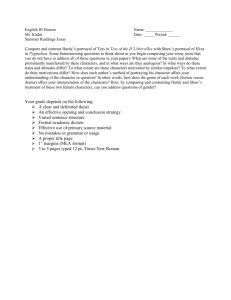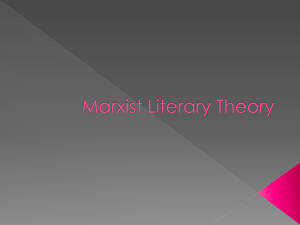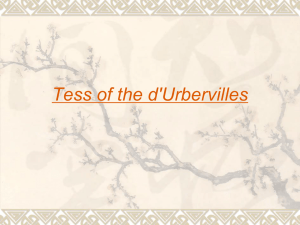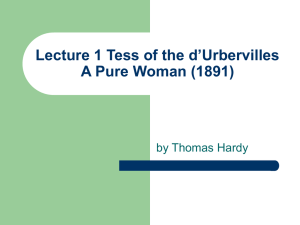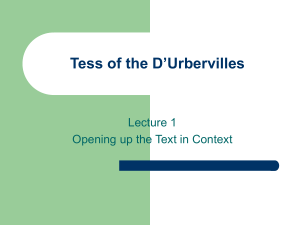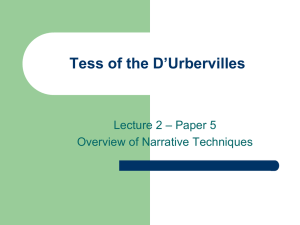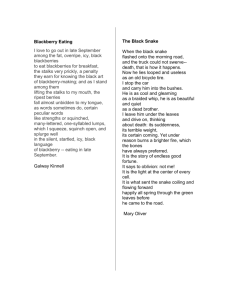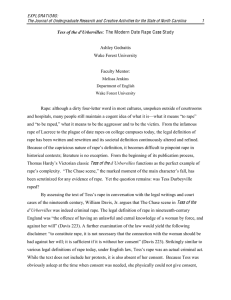Religion in Tess of the D'Urbervilles: Analysis & Themes
advertisement
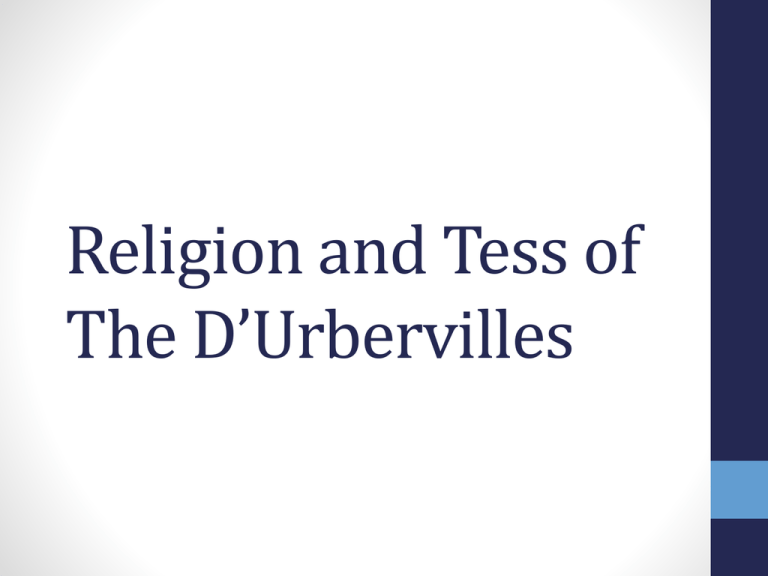
Religion and Tess of The D’Urbervilles Phase the Fourth • Hardy was struggling with his own religious beliefs, much like Angel. He idealised the paganism of the past, but was also attached to his family’s Christianity • He accepted that some sort of supernatural being controlled fate. Tess’ hardships are described as mere sport for the “President of the Immortals” which contrasts with the Christian idea of a God who has a benevolent plan for everyone, and connects with the notes of paganism throughout the novel. • Tess is usually portrayed as an embodiment of pagan innocence, a sort of English nature goddess- the fertility ritual of May-Day, whistling to the birds and mercifully killing the injured pheasants. Angel even describes her as a “new-sprung child of nature” and compares to mythical women like Eve and Artemis. Phase the Fourth • She regarded him as Eve at her second waking might have regarded Adam.” Alec is Satan. He seduces Tess under a tree, giving her sexual knowledge in return for her lost innocence. The very name of the forest where this seduction occurs, the Chase, suggests how Eve will be chased from Eden for her sins. This guilt, which will never be erased, is known in Christian theology as the original sin that all humans have inherited. Tess is the troubled, indecisive Eve whilst Clare is the noble Adam newly born. • Tess also represents a different form of divinity- the role of a sacrificial victim- associated with both Christianity and Paganism. It is significant that when Tess’s sins catch up with her and the police arrest her, it is at Stonehenge. At the time of writing, this was thought to be a heathen’s (someone who doesn’t belong to a widely held religion) temple. Phase the Fourth • There is a clear division between Angel and his brothers. Felix Clare is a parish minister described by Hardy as "all Church," while Cuthbert, dean of a college, seems to be "all College." Angel is then seen by his older brothers as "growing in social ineptness," and Angel sees his brothers as "growing [with] mental limitations." • Each sees the other not as opposite, but as flawed in ways that can divide families. Cuthbert is "the more liberal minded," though "he had not much heart." Likewise, Felix is "less self-sacrificing and disinterested." Thus both men are not like Angel in many respects when "[n]either saw the difference between local truth and universal truth; that what the inner world said in their clerical and academic hearing was quite a different thing from what the outer world was thinking." Felix asks Angel if he is "somehow losing intellectual grasp." Angel responds, "[I]f it comes to intellectual grasp, I think you, as a contented dogmatist, had better leave mine alone, and inquire what has become of yours." Thus, Angel feels that "despite his own heterodoxy, he was nearer to his father on the human side than was either of his brethren." Phase the Fourth • During the century, the Church of England could be divided into three groups, clearly seen in the novel. • The Low Church/evangelical: It upheld the importance of preaching, the Bible, individual conversion or a personal experience, and was often quite simple in its worship. They believed that human beings are profoundly affected by sin and therefore unable to achieve a close relationship with God by their own efforts, no matter how hard they try. Angel’s father is an example of the evangelical Church of England. Hardy appears to admire his sincerity and courage. He is thought to be modelled on the Rev. Henry Moule of Fordingham, a poor suburb of Dorchester. Moule's sons also went to Cambridge, and Hardy was much influenced by one of them, Horace, while he was a young man in Dorchester. • The broad church: The broad church group believed the Church of England was the national church and therefore should be broad enough for everyone to join. They did not insist on a rigid following of the 39 Articles, the guidelines for Anglican belief. They tended to count everyone in as Christians unless they opted out. The vicar of Marlott is a good example here - he is willing to ‘bend the rules' somewhat to accommodate Tess. • The high church: The high church section grew in importance from the 1840s. It wanted to establish Anglican beliefs as essentially Catholic, which then led to concern for reviving ritual practises lost at the formation of the Church of England in the sixteenth century. It especially wanted to restore the sense of awe in worship, and to stress the importance of the sacraments. Phase the Sixth Chapter XLV • The entire paragraph on top of page 395, describes the change in Alec D’Urberville’s character, which is not only ironic, but also hypocritical as it quickly returns to the we previously see in earlier parts of the novel. • ‘…It was less a reform than a transfiguration…. animalism has become fanaticism; paganism Paulinism…rude energy of a theolatry that was almost ferocious.’ • Fanaticism: belief or behaviour involving uncritical zeal, or an obsessive enthusiasm. A philosopher George Santayana defines fanaticism as ‘redoubling your effort when you have forgotten your aim” which seems to fit the description of Alec’s character. • Paganism: based on the worship of nature or a person who is not a Jew, Christian or Muslim; a heathen. In other words, a hedonistic or irreligious person which Alec most certainly is. Hardy is satirising his character greatly, perhaps using him as a tool for humour and irony. Also, exploiting the hypocrisy existing in region. • Paulinism: a theory which considers Jesus the supreme authority of Christianity, and a follower aims to restore Jesus’ sayings to their original purity which is incredibly ironic considering the character of Alec. • theolatry: derives from the Greek, meaning the worship of a deity • taken from the notes in the Penguin Classics edition, authorial comment is presented explaining that Alec’s complete change allows Hardy to show explicitly what has been implicit in the description of the Clares: the sexual mastery underlying religious fanaticism, the paganism underlying the Pauline fundamentalism of the Reverend Clare, and the close relationship between theolatry ad Tess’ worship of Angel. Phase the Sixth • Chapter XLVI • ‘I believe in the spirit of the Sermon on the Mount , and so did my dear husband….’ • The sermon on the mount (Matthew 5-7) is the longest and fullest record of Christ’s teaching. Tess’s adherence to its ‘spirit’ is further evidence that her faith, like Clare’s, is held in deep suspicion of the dogma of organised religions, for her the New testament is a Christian not a Pauliad, like it is for Alec. • Tess’s views are a reflection of Hardy’s personal views on religion, somewhat doubtful or cynical. • ‘Dictionnaire Philosophique to Huxley’s essays’ • written by Voltaire, who bitterly opposed organised religions, but believed in a righteous God. • Hardy perhaps liked this criticism, and so referenced it to enforce his rather controversial, or unconventional views at the time. • Huxley, in the other hand, a Victorian agnostic, published essays, in which he stated ‘i have great respect for the Nazarenism of Jesus- very little for later Christianity’ • ‘…like the devils I believe and tremble…’ • This recalls the Reverend Clare’s hatred of St James’ theology of good works, and also points out how hollow Alec’s ‘faith without works’ is, and how dangerous Clare’s theology is. • Ref. from James 2:19 Phase the Sixth • Chapter XLVII • ‘..a creature from Tophet’ • Like a visitant from the valley of fire near Gehenna outside Jerusalem, a kind of hell where idolatrous Jews burnt their sons and daughters (Jeremiah 7:31) a reference towards Alec, unsurprisingly. • God of the underworld in Greek mythology, which links to the view of hell in Christian teachings. ‘..his Plutonic master’ • ‘Why, you can have the religion of loving-kindness and purity at least, if you cant have- what do they call it- dogma.’ • Tess is summarising Voltaire, Huxley and Hardy himself. • At the heart, is the idea of sincerity, which Hardy felt was being deeply compromised by dogma • ‘And she shall follow her lover, but she shall not overtake him; she shall seek him, but shall not find him: then shall she say, I will go and return to my first husband; for then was it better with me than now!’ • Hosea 2:7 • The prophet is referring to idolatry • Ethelberta uses this same quotation in The Hand of Ethelberta to express her scruples about leaving her first love for a richer man, likewise Tess does so later. Hardy is again contextually foreboding her future. Phase the Sixth • • • • • • • • Chapter XLVIII ‘my last state will be worse than my first’ Luke 11:26 Jesus preaches on the perils of an imperfect repentance and conversion. The sinner who believes the devil has gone finds ‘seven other spirits more wicked than himself, and they enter in, and dwell there: and the last state of that man is worse than the first.’ Tess fears she will fall into temptation again, and the allusion also echoes Alec’s situation, as Alec’s will become worse than he was before. Chapter XLIX ‘Was not the gleaning of the grapes of Ephraim better than the vintage of Abi-ezer?’ refers to Judges 8:2 and the victory of the Israelites over the Midianites, Gideon, the general of the Israelites, pacifies them by assuring them that cleaning up after the battle is more honourable than actually winning it. Tess accepts that by returning to Alec, she has won due to the stability she regains, as her rape has been somewhat forgotten, however she has lost her husband and only love. Phase the Seventh • Before Tess was sacrificed for the good of society, she and Angel flee from the police, to Stonehenge. When they are found, Tess lies asleep upon an altar. The significance of this is that it is believed the Druids and Pagans used the altar to present sacrifices, although this has never been fully proven due to a lack of historical evidence. • Fundamentally, Stonehenge for Hardy stands for ‘the natural’, and – as Hardy himself makes clear – Tess Durbeyfield, described in the subtitle of Tess as ‘a pure woman’, is pure in the sense of being ‘natural’, in her femininity, her beauty, and her motivations. Therefore Stonehenge is used as a metaphor for Tess. • Furthermore, the stones of Stonehenge represent the unyielding nature of the fate that, for Hardy, determines human destinies. Phase the Seventh • Although Hardy was Agnostic, he bore no negativity towards Christianity. In fact Hardy admired some aspects of Christianity- especially their charitable natures. The Clare’s are examples of pure Christian charity- they did not shun Tess upon discovering the reason for Angel and Tess’ separation. Instead, they pity her for her past sin • In Chapter LIV, Angel passes the Cross In Hand stone, the ill omened stone that Tess once swore upon. There is an irony in the fact that Tess tries to redeem herself by swearing in the presence of God, yet fate works against her in a stone that is not holy, but was once a medieval torture device-it was said that the man who died there sold his soul to the devil.
